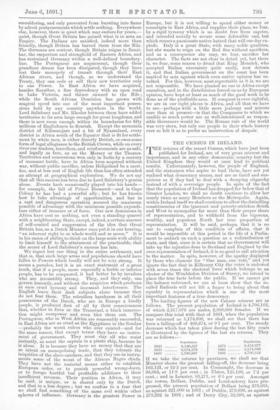THE DIVISION OF AFRICA.
IT may, we think, be fairly assumed that the dispute between Great Britain and Portugal as to their respective rights in Africa has come at last to an end. The Portuguese Government, which knows quite well that its African territories, whatever they may produce for indi- viduals, are heavy burdens on its harassed Treasury, the most optimist financiers not hoping to make them pay their way, has always been fairly moderate ; and the people of Lisbon at last appear to see that they have been fairly treated. The concession of the lowlands has cooled their pride, they show no disposition to blaze up under the rather high-handed proceedings of the South Africa Com- pany, and there is every probability that the Treaty will be signed, and so far as a weak State can ever observe engage- ments too large for its full control, will be observed. It is a good opportunity, therefore, to review what the Govern- ment has really done towards settling one of the largest and most difficult questions which ever arose to disturb the harmony of Europe, the distribution of Africa. That question, which sprang up with almost inexplicable sud- denness, has pressed upon Lord Salisbury from the moment he accepted the Foreign Office, and has repeatedly assumed an almost dangerous aspect. Germany was determined to share in the ownership of East Africa. France was raging with jealousy at the idea that a continent should be divided and she not obtain a share proportioned to "her just place in the world's affairs," and showed that rage by an attitude which was almost one of menace both in Cairo and at Fez. Italy, always interested in the Valley of the Nile, had de- cided to claim for her portion Abyssinia and a seat on the Red Sea ; while the Portuguese dreamed a dream of a new Brazil stretching from ocean to ocean, and comprising the most fertile regions of sub-tropical Africa. Every one of these Powers claimed positions which apparently threatened British interests, two of them, Germany and Portugal, in the most serious and direct way. Germany was directly resisting us in Zanzibar, while Portugal, besides intending to throw herself right across the path to the North, was whispering most dangerous suggestions to the Boers. At the same time, the British Government found that its hands were not perfectly free for the necessary negotiations. A large section of the British public, with its usual ignorance of comparative geography, thought that " Africa " would furnish a "new market," that we ought somehow to claim all Eastern and Southern Africa, and that enough had been sacrificed in agreeing to the curious compromise, never yet completely explained, under which the immense Valley of the Congo was handed over to the King of the Belgians in his individual capacity. The mercantile world pleaded for enormous protectorates as essential to fresh trade. The Scotch were indignant that anybody should ever claim any land which Dr. Livingstone had surveyed, or their missionaries were describing as fields for Christian enterprise. Finally, the Cape Colonists, always ambitious, were looking eagerly towards the North, and furious at the idea that any Power should be allowed even the chance of thwarting their aspirations in that direction, aspirations which stretched from Cape Town to Lake Victoria at least, if not even further. There was, moreover, an idea preva- ]ent among the whole governing class, and reiterated with acrimony in most journals, that England would be " jockeyed " in Africa, and that in the final settlement she would find herself left with nothing in her hands worth having. Almost in silence, certainly without any declaration of general policy, Lord Salisbury took up his burden ; he has, as he recently, stated, paid unremitting attention to it ever since, and we can now see something of the general result. He has, to begin with, fought no war, opened up no new quarrel, spent no money belonging to the taxpayer, and yet all the dangerous African questions but two have been arranged. Egypt, it is true, though she remains under British guardianship, and her finances have been restored, is still the subject of perpetual dispute with France, and the question of Morocco is always smouldering, and only prevented from bursting into flame by adroit postponements which settle nothing. Everywhere else, however, there is quiet which may endure for years,— quiet, though Great Britain has gained what is in area an Empire. The Italians are satisfied, indeed more than friendly, though Britain has barred them from the Nile. The Germans are content, though Britain reigns in Zanzi- bar, the emporium and stronghold of Eastern Africa, and has restrained Germany within a well-defined boundary- line. The Portuguese are acquiescent, though their grandiose dream has been dissipated, though they have lost their monopoly of transit through their East African rivers, and though, as we understand the Treaty, they can cede or sell their new territories only to one Power. In East Africa we have acquired, besides Zanzibar, a fine dependency with an open road to Lake Victoria, and thence onward to the Nile ; while the South African Dominion has grown with magical speed into one of the most important posses- sions held by any country, anywhere in the world, Lord Salisbury and Mr. Rhodes between them have added territories to its area large enough for great kingdoms, and there is now room enough within its boundaries for fifty millions of Englishmen to flourish. Except the mountain district of Kilimanjaro and a bit of Nyassaland, every district in Africa south of the Equator that is fit for settle- ment by white men, is either directly British, or owes some form of legal allegiance to the British Crown, while on every river our traders, travellers, and reinforcements are as safe, and legally as free, as on the Mersey or the Thames. Territories and concessions won only in India by a century of incessant battle, have in Africa been acquired without war, without public sacrifice, unless Heligoland be a sacri- fice, and at less cost of English life than has often attended an attempt at geographical exploration. We do not say that all this success has been due to Lord Salisbury's genius alone. Events hale occasionally played into his hands— for example, the fall of Prince Bismarck—and in Cape Colony he has had a powerful ally ; but he has known how to take advantage of opportunities, and has in a vast and dangerous operation secured the maximum possible of advantage with the minimum possible expendi- ture either of treasure or of force. Our new dominions in Africa have cost us nothing, not even a standing quarrel with a neighbouring State, except, indeed, a certain amount of self-control and suppression of the idea that Great Britain has, as a Dutch Minister once put it in our hearing, " an inherent right to ze whole world and ze moon." It is in his union of ability, to think on the large scale with ability to limit himself to the attainment of the practicable, that the secret of Lord Salisbury's success has lain. -We regret but one thing in the entire settlement, and that is, that such large areas and populations should have fallen to Powers which locally will not be very strong. It seems a paradox, but it is an exact statement of a great truth, that if a people, more especially a feeble or inferior people, has to be conquered, it had better be by invaders who are irresistibly strong. They, and they only, can govern leniently, and without the suspicion which produces at once cruel tyranny and incessant interference. The English leave their dark subjects alone because they do not fear them. The relentless harshness in all their possessions of the Dutch, who are in Europe a kindly people, is produced first of all by their consciousness that, whether in Java or the Transvaal, a black insurrec- tion might overpower and even blot them out. The Portuguese, who in West Africa are reasonably successful, in East Africa are as cruel as the Egyptians in the Soudan —probably the worst rulers who ever existed—and for the same reason, that except terror they have no instru- ment of government. They must slay all who resist instantly, as must the captain in a pirate ship, because he is alone. It is because they have no money that they are s. o. intent on monopolising trade, that they tolerate the iniquities of the slave-catchers, and that they use as instru- ments some of the worst of the African Negro chiefs. They have not the material means either to establish European order, or to punish powerful wrong-doers, or to forego hurtful but profitable additions to their insufficient revenue. Their position in Africa, it may be said, is unique, or is shared only by the Dutch, and that in a less degree ; but we confess to a fear that we shall find something of the same evil within other spheres of influence. Germany is the greatest Power in Europe, but it is not willing to spend either money or conscripts in East Africa, and supplies their place, we fear, by a rigid tyranny which is no doubt free from caprice, and intended usually to secure some defensible end, but which rouses a passionate native hatred that will one day ex- plode. Italy is a great State, with many noble qualities, but she wants to reign on the Red Sea without sacrifices, and as a consequence she may, we fear, sacrifice her character. The facts are not clear in detail yet, but there is, we fear, scene reason to dread that King l'slenelek, who accepted Italian suzerainty quite easily, now detests it, and that Italian government on the coast has been marked by acts against which even native opinion has re- volted. For this, however, most regrettable as it is, we are not responsible. We have planted no one in Africa except ourselves, and in the distribution forced on us by European opinion, have kept at least as much of the good work to be done as of the profitable area. If conquest is ever rightful, we are in our right places in Africa, and all that we have to see—perhaps with a little more jealousy and minute care than at present—is that the Companies to which we confide so much power are as well-intentioned as respon- sible Governors would be. The Roman rule of the world was very stern, but only one people in their whole history ever so felt it as to prefer an insurrection of despair.







































 Previous page
Previous page